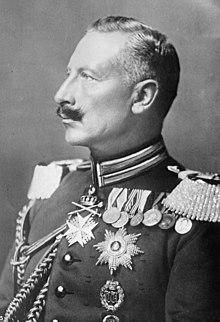Wilhelm II of Germany
| Wilhelm II | |||||
|---|---|---|---|---|---|

Kaiser Wilhelm II, c. 1914
|
|||||
| German Emperor; King of Prussia | |||||
| Reign | 15 June 1888 – 9 November 1918 | ||||
| Predecessor | Frederick III | ||||
| Successor | Monarchy abolished Friedrich Ebert, President of Germany |
||||
| Chancellors | |||||
| Born |
27 January 1859 Crown Prince's Palace, Berlin, Prussia |
||||
| Died | 4 June 1941 (aged 82) Huis Doorn, Doorn, Netherlands |
||||
| Burial | 9 June 1941 Mausoleum at Huis Doorn |
||||
| Spouse |
Augusta Victoria of Schleswig-Holstein (m. 1881–1921); her death Hermine Reuss of Greiz (m. 1922–41); his death |
||||
| Issue | |||||
|
|||||
| House | Hohenzollern | ||||
| Father | Frederick III, German Emperor | ||||
| Mother | Victoria, Princess Royal | ||||
| Religion | Lutheranism | ||||
| Signature |  |
||||
| Full name | |
|---|---|
| German: Friedrich Wilhelm Viktor Albert Frederick William Victor Albert |
|
Monarchical styles of German Emperor Wilhelm II, King of Prussia |
|
|---|---|
 |
|
| Reference style | His Imperial and Royal Majesty |
| Spoken style | Your Imperial and Royal Majesty |
| Alternative style | Sire |
Wilhelm II or William II (German: Friedrich Wilhelm Viktor Albert von Preußen; English: Frederick William Victor Albert of Prussia; 27 January 1859 – 4 June 1941) was the last German Emperor (Kaiser) and King of Prussia, ruling the German Empire and the Kingdom of Prussia from 15 June 1888 to 9 November 1918. He was the eldest grandchild of the British Queen Victoria and related to many monarchs and princes of Europe.
Crowned in 1888, he dismissed the Chancellor, Otto von Bismarck, in 1890 and launched Germany on a bellicose "New Course" in foreign affairs that culminated in his support for Austria-Hungary in the crisis of July 1914 that led in a matter of days to the First World War. Bombastic and impetuous, he sometimes made tactless pronouncements on sensitive topics without consulting his ministers, culminating in a disastrous Daily Telegraph interview in 1908 that cost him most of his influence. His leading generals, Paul von Hindenburg and Erich Ludendorff, dictated policy during the First World War with little regard for the civilian government. An ineffective war-time leader, he lost the support of the army, abdicated in November 1918, and fled to exile in the Netherlands.
Wilhelm was born on 27 January 1859 at the Crown Prince's Palace, Berlin to Prince Frederick William of Prussia (the future Frederick III) and his wife, Victoria, Princess Royal, the eldest daughter of Britain's Queen Victoria. At the time of his birth, his great-uncle Frederick William IV was king of Prussia, and his grandfather and namesake Wilhelm was acting as Regent. He was the first grandchild of Queen Victoria and Prince Albert, but more importantly, as the first son of the Crown Prince of Prussia, Wilhelm was from 1861 second in the line of succession to Prussia, and also, after 1871, to the newly created German Empire, which, according to the constitution of the German Empire, was ruled by the Prussian King.
...
Wikipedia
